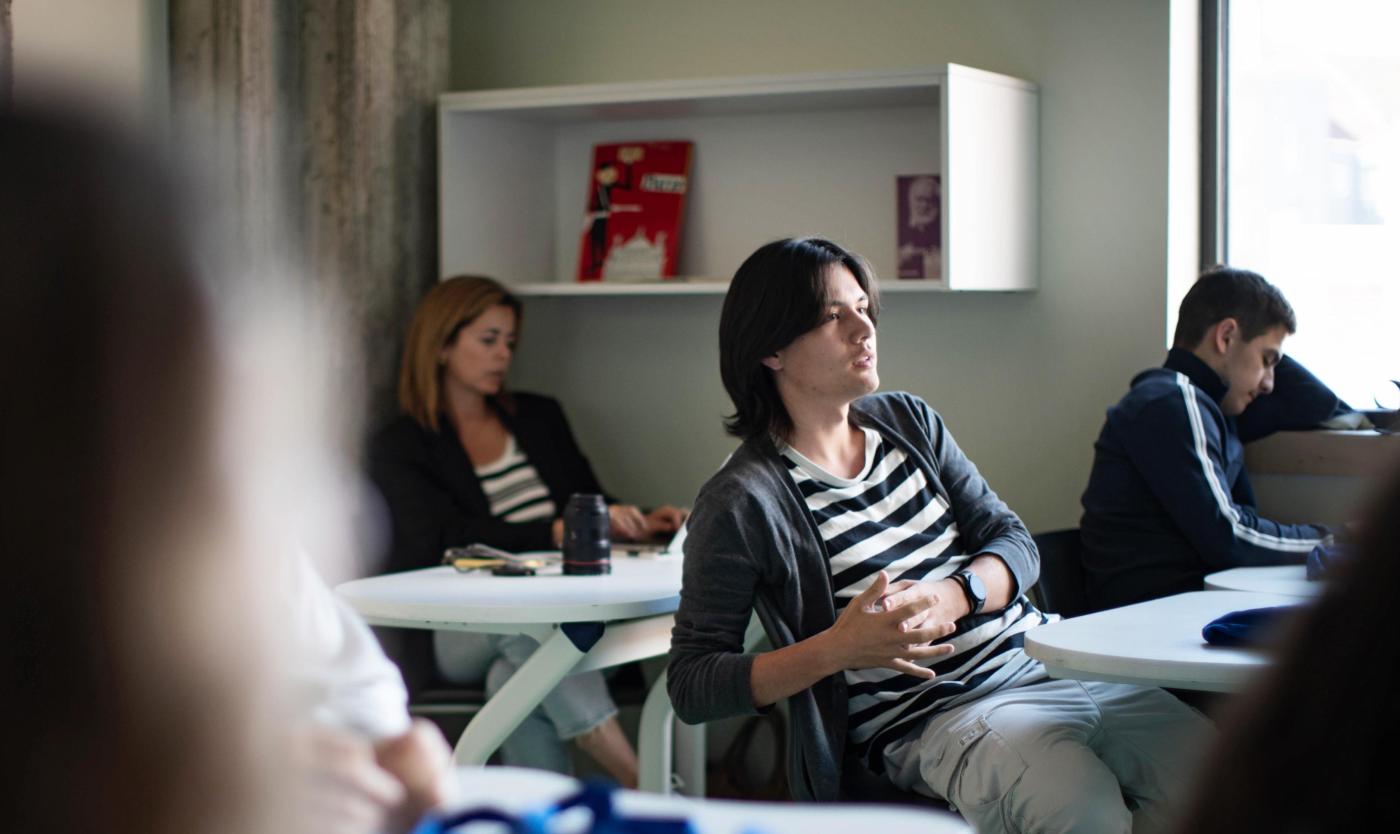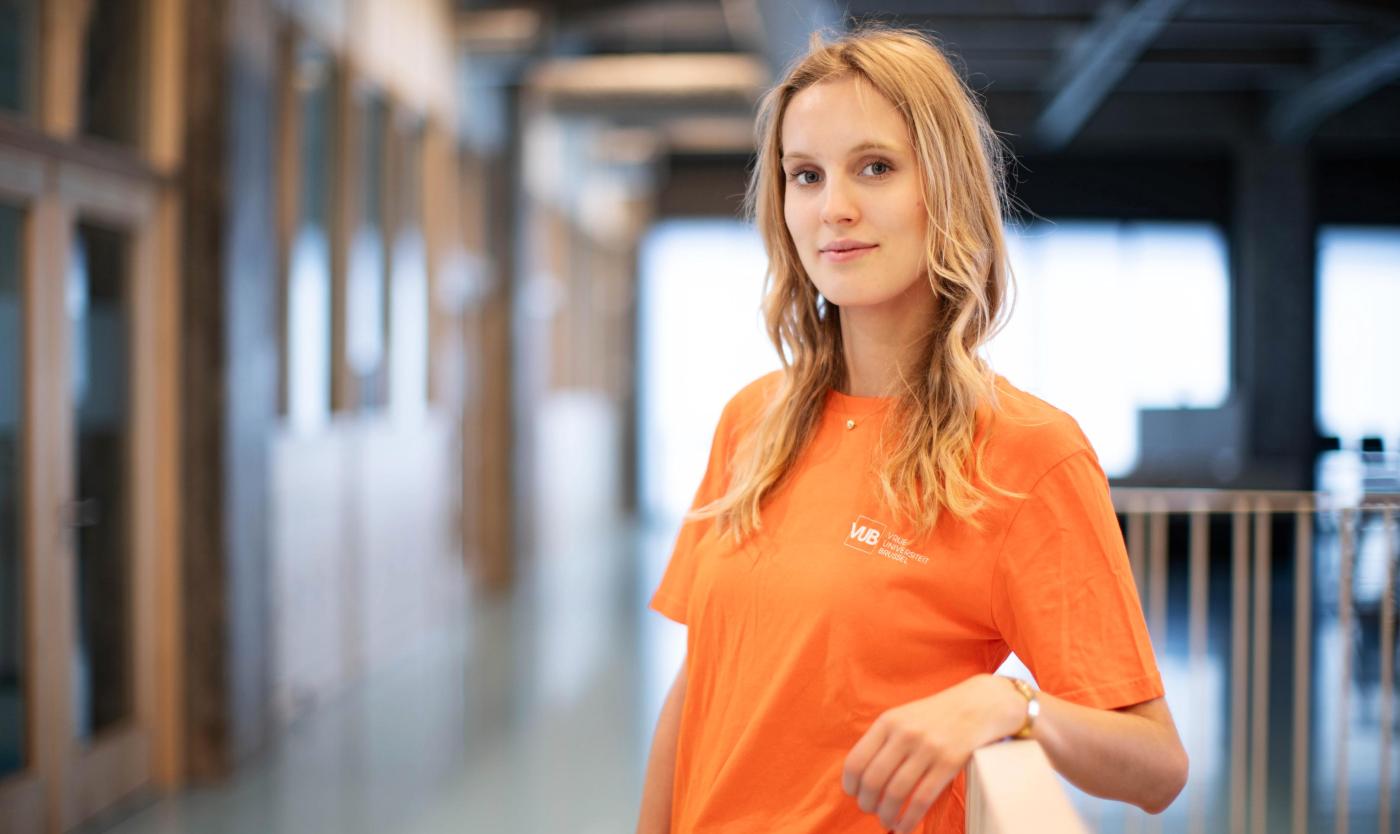
What does studying at university really mean? The VUB’s PACT School Tour brings the lecture hall straight to the classroom. On Friday 16 May, it was the turn of the Caroline Pauwels Atheneum in Molenbeek. On the agenda: a guest lecture on polarisation by VUB researcher Kamil Bernaerts. Here’s how it went down.
A class full of final-year students from the humanities and technological sciences gets ready to sample two hours of university life. Sparking critical thinking — that’s Kamil Bernaerts’ mission. The big question of the day: is polarisation undermining our democracy? Not the easiest topic, but the PhD researcher is up for the challenge. “Taking notes helps,” he tips. “With pen and paper, it’s easier to focus.”
Using his own research and global data, he paints a picture of how democracies are evolving. “Today, only one in ten people live in a liberal democracy. In some countries, we have to ask ourselves how much longer the democratic model can hold. Think of how President Trump has put democratic values under pressure, or how people like Elon Musk wield enormous influence thanks to their wealth. Democracies worldwide are under strain — and globalisation, inequality and, yes, polarisation all play a part.”

But Bernaerts’ class is far from a dry lecture. He pulls the students in, asks questions, and challenges them to think along. The core message? Polarisation can be a threat to democracy. “It increases the risk of discrimination, erodes trust, and can reduce support for democratic systems. In extreme cases, it can even lead to violence — just look at the storming of the Capitol.” But not all polarisation is bad. “It puts tough topics on the table and can be the start of progress.” He refers to historic examples, like the legalisation of abortion in Belgium. “Did you know Belgium wasn’t technically a kingdom for a day because King Baudouin refused to sign the abortion law? That sparked major division, but also led to one of the world’s most liberal abortion laws today.”
Contrary to what many students assume, Belgium is less polarised than you might expect, despite its language and cultural differences. “That’s thanks to our political system. People complain about the number of parties and endless negotiations, but our consensus-based model actually helps absorb conflict.” The way a democracy is organised really does matter. “Consensus models like Belgium’s are more resistant to polarisation than majority-rule democracies like in the US or UK.” And the type of polarisation makes a difference too. “Ideological differences aren’t necessarily dangerous — they’re part of a healthy democracy. It’s emotional and relational polarisation — driven by hate and exclusion — that’s the real risk.” That message stuck with the students. You won’t win everyone over on a topic like this. Disagreement is part of it. But those who were engaged left with food for thought and a sharper eye on the future.
Student ambassador Zoélie Aurélia M. Prickartz Lewkowicz inspires the students with her personal story. “Not long ago, I was sitting in school just like you,” Zoélie tells the students. “I know how hard it can be to make the leap to higher education.” She also struggled with choosing the right course. “In the end, I chose agricultural sciences — a path with lots of options. With over 32 bachelor’s and 85 master’s programmes, VUB has something for everyone. And for those who prefer hands-on learning, our partner school Erasmus University College is worth checking out.” Her golden tip for anyone still unsure? “Go to open lecture days. Figure out what you enjoy and what you're good at. Ask friends, family, and teachers for advice — but don’t take everything at face value. Think critically and ask questions. Even to VUB lecturers and professors — they’re always up for a chat.” That’s VUB in a nutshell: freedom of thought, room for dialogue, and critical questioning.

But university life is about more than just studying. “I know you're all from Brussels, but trust me — experiencing the city from the VUB campus is something else. The VUB is like its own little island. You can play sports, go out, get involved in student organisations… And soon, I’ll hit the highlight of my student journey: stepping onto the balcony of Brussels Town Hall at Grand Place. That magical moment when you graduate. I hope you’ll get to experience that yourselves in a few years.”

Manel (final-year humanities student)
Student Manel: “I gained new insights into things i’d never really thought about”
Manel: “We’ve visited a few colleges already, but this is the first time a university came to us. I thought that was really interesting. At first, I wasn’t very engaged with the topic, but the way the researcher presented it made it compelling. I gained new insights into things I’d never really thought about. Next year, I want to train as a PE teacher. I was torn between university and college, but after this session, I think Erasmus University College suits me better. I prefer practical learning. I’ve still got time to decide, but sessions like this really help. It’s intense and takes focus, but it makes you think.”
Student Tom: “Today’s session confirmed my choice to study computer science”

Tom (final-year technological sciences student)
Tom: “What I appreciated most was the passion with which the speaker talked about his research. You can tell he really knows what he’s talking about. Polarisation is such an important topic, just like critical thinking. I just don’t see enough of that in the people around me. I often feel school doesn’t challenge me enough. This session went deeper and really made me think. That suits me. I’m already looking forward to next year. I want to study computer science at the VUB. Today’s session confirmed that choice.”

Zoélie Aurélia M. Prickartz Lewkowicz (VUB Student Ambassador)
VUB Student Ambassador Zoélie: “It’s pretty special that a aniversity comes to you”
Zoélie: “It felt like I was talking to a group of friends today. I’m only a few years older than them, so I definitely don’t come here pretending to know everything. But I hope my story meant something to them. I struggled with choosing my studies too. Schools do their best to guide you, but it’s pretty special when a university actually comes to you. A session like this would’ve really helped me back then. My first real encounter with VUB was during a guest lecture on sociology. Open lecture days are so valuable. You get immersed in the academic world. That made everything clear. Today, the students got a little taste of that. Polarisation is a tough topic, but it fits the VUB perfectly. It’s okay to rub up against difficult ideas. And once one student gets involved, the rest follow. Sometimes they just need a little push. I hope we gave them that today. That they dare to ask questions — to student support, and to our professors. They’re really there to help.”
Researcher Kamil: "Students sometimes ask surprisingly good questions. It keeps me sharp”

Kamil Bernaerts, researcher at VUB
For PhD researcher Kamil Bernaerts, the VUB Pact School Tour is about much more than promotional talk. It fits with his personal mission: getting people to think about the world they live in. “I see it as my job to share knowledge — funded by the public — with the public. Especially with young people. They’re often very interested in political issues, as long as you don’t call it politics.” Raising a topic like polarisation in the classroom is no small task. “You want to teach something, but without coming across like a distant professor. That’s not what VUB is about. It’s a constant search for the right tone: when do I have them, when do I lose them? Students sometimes ask surprisingly good questions. It keeps me on my toes. I also see it as a small political act — I want young people to realise democracy isn’t a given. It’s a luxury we have to protect. Even our society isn’t immune to anti-democratic forces. Our young people are the politicians of tomorrow. It’s important to spark their critical voice now.” A personal conversation with a professor once made a big difference for Kamil too. “At a student fair, I ended up chatting with the late VUB professor Jan Loisen. That pushed me to study Social Sciences at VUB. Today, I hope I can be that spark for the students of tomorrow.” That open, personal approach is exactly what makes VUB so unique for Kamil. “I hope that came across today.”*
*This is a machine translation. We apologise for any inaccuracies.
The world needs you
This initiative is part of VUB's public programme: a programme for everyone who believes that scientific knowledge sharing, critical thinking and dialogue are an important first step to create impact in the world.
As an Urban Engaged University, VUB aims to be a driver of change in the world. With our academic edcuational programmes and innovative research, we contribute to the Sustainable Development Goals of the United Nations and to making a difference locally and globally.
Create more impact Receive invitations for VUB's public activities